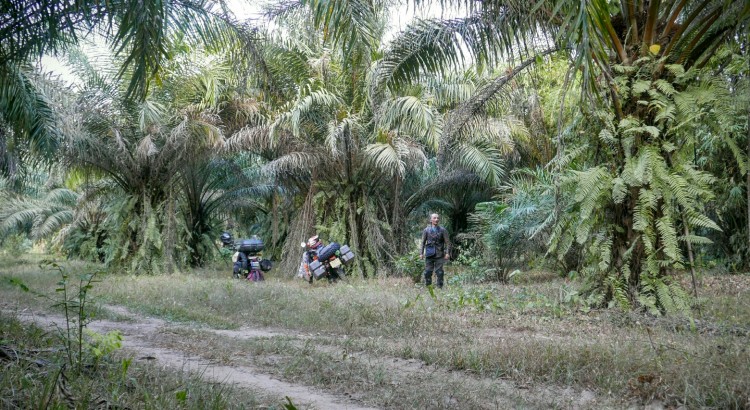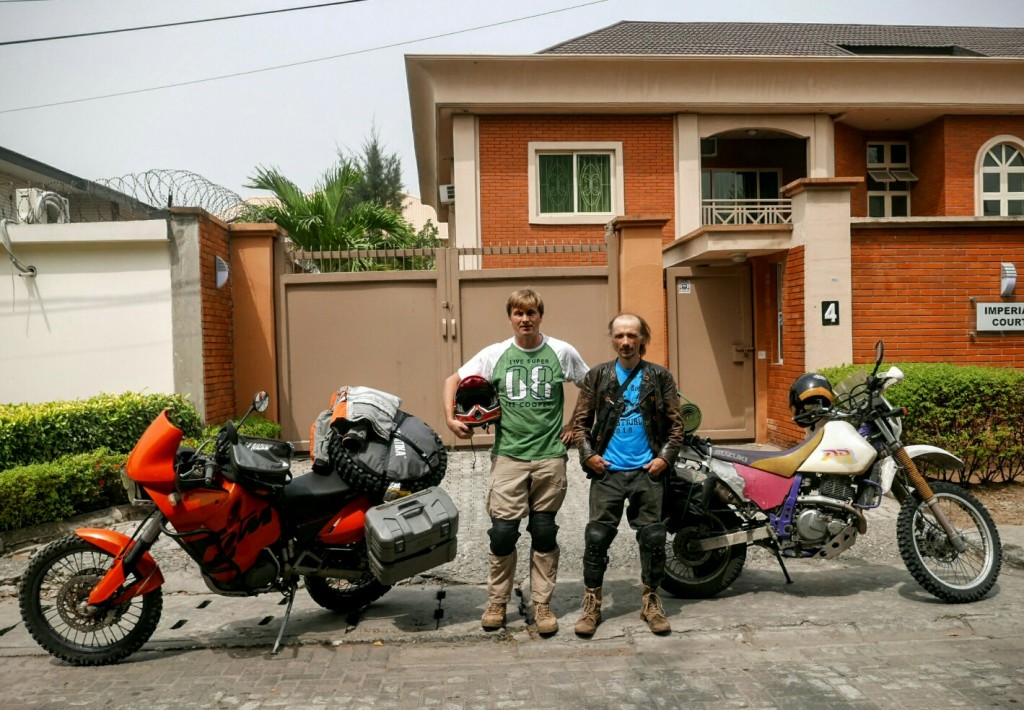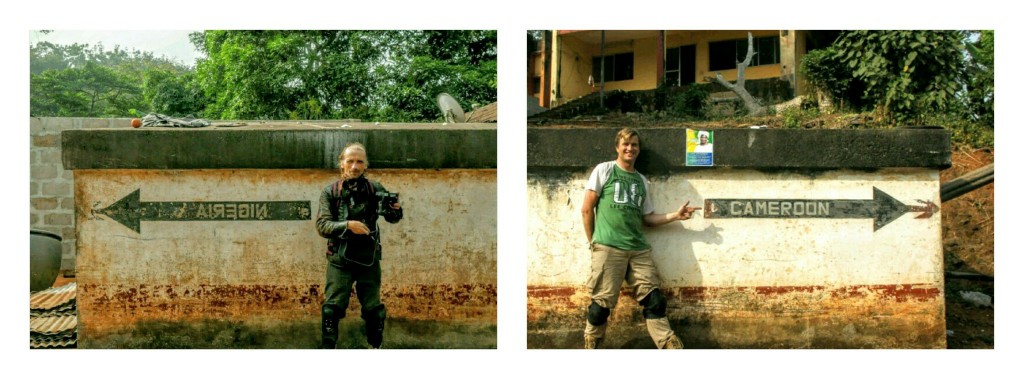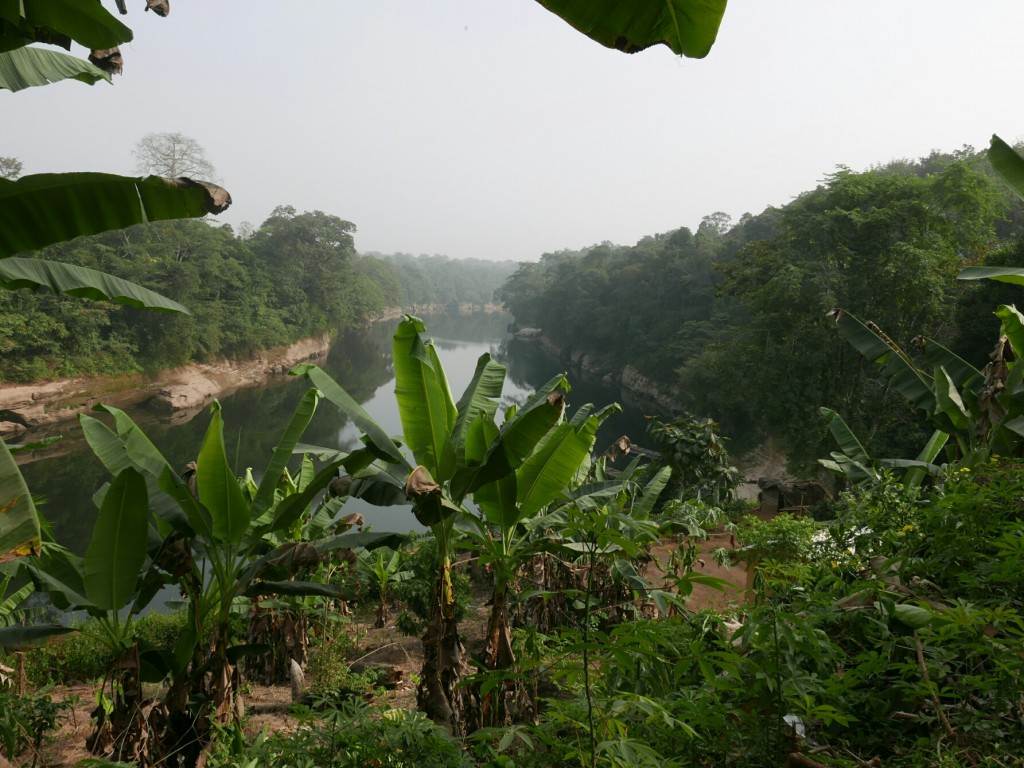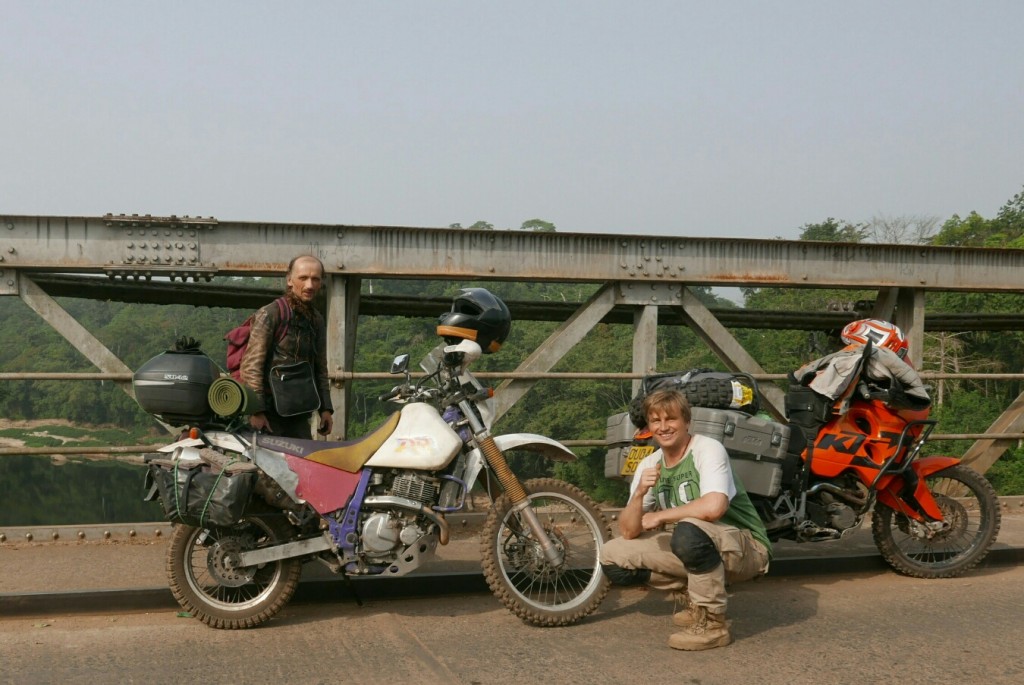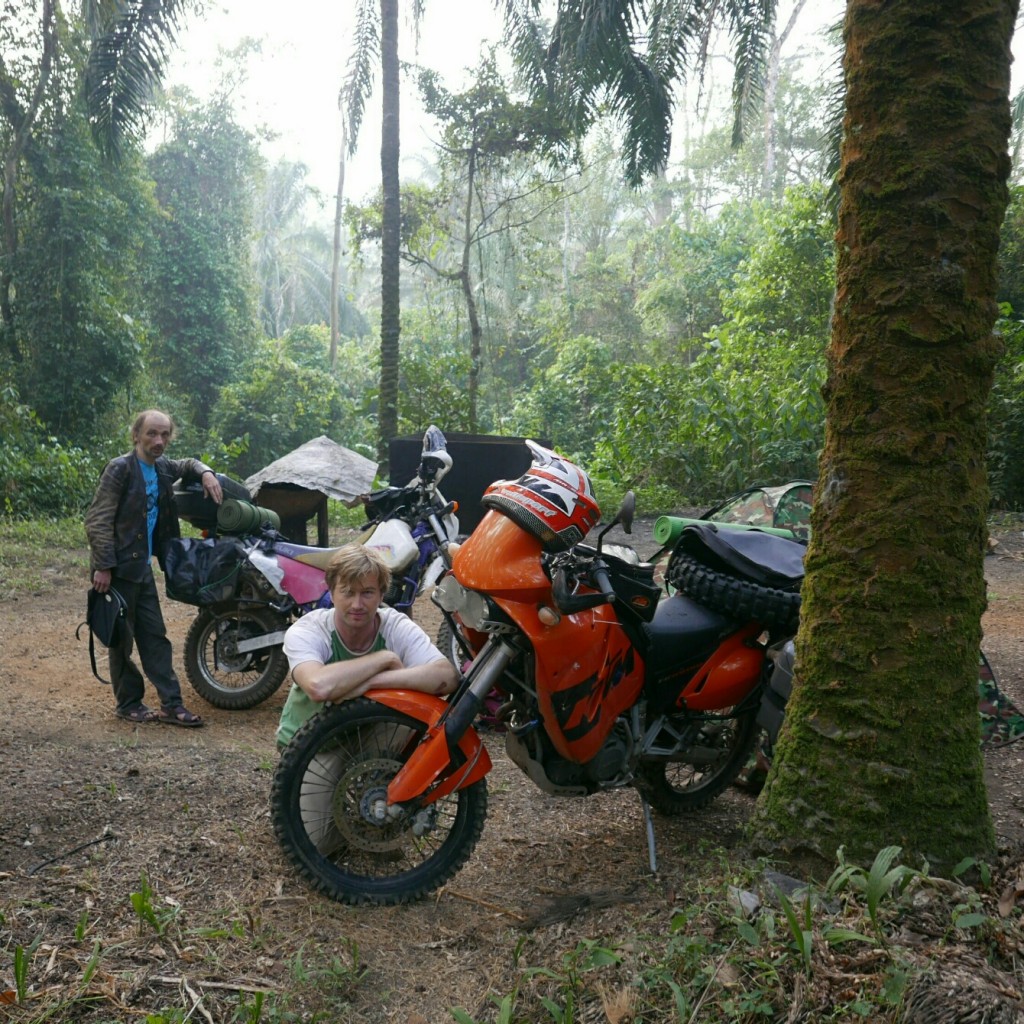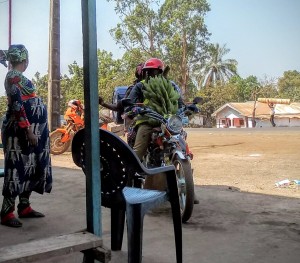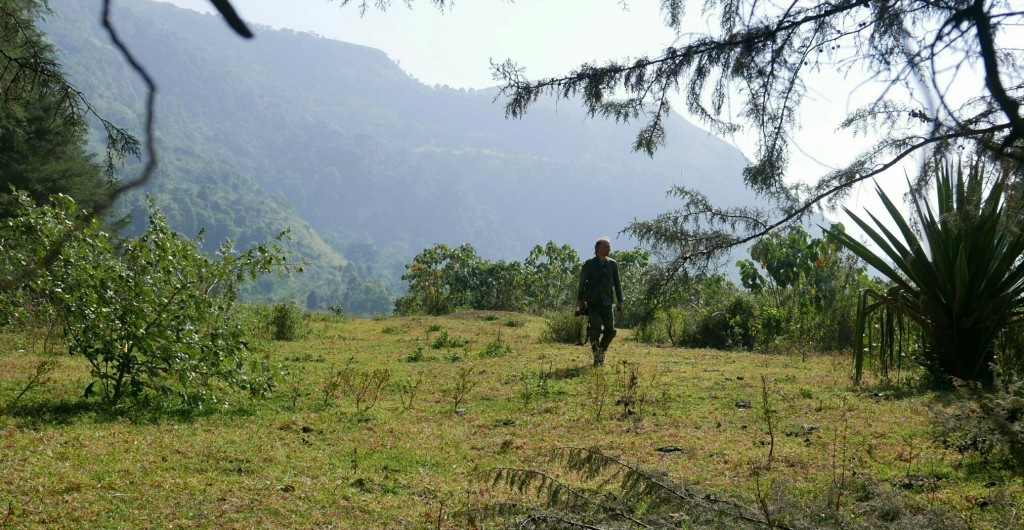7:30 am we arrive at Tincan Island port. The bikes are supposed to come out today, but I’m leaving nothing to chance now. Our customs agent is clearly stressed and suggests we meet at Dominos next to his office. He is a petty thief. He is stealing from his employer – Sifax, who are decent shipping company. When it gets to payment, he insists I transfer the money to his personal account. So he gets the jobs through his employer, uses the company’s connections and tools, but charges as a freelancer. My friend manages a fleet at a logistics company here and complains that everyone steals. The driver claims that the vehicle (vecu in pidgin) is broken. It may be, but he has created that fault so that his friend can charge for fixing it. Their imagination is active, one dude had filled the fuel tank with toilet paper.
Lagos – bike unpacking
New photo added to shared album
.
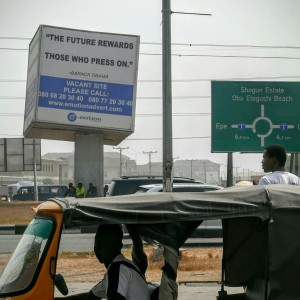 The place is rammed with tank trucks, container trailers and endless number of ocado scooters. It’s messy as hell. We find that now we need only two more papers – an exit note and a terminal delivery order. We wait as the agent is queuing at the customs offices. At 2pm we finally see our box on the white van, ready to take the final ride our residence. By 4pm we have Kotilda and Suusi together again, poured the fuel in, press start and wroom.
The place is rammed with tank trucks, container trailers and endless number of ocado scooters. It’s messy as hell. We find that now we need only two more papers – an exit note and a terminal delivery order. We wait as the agent is queuing at the customs offices. At 2pm we finally see our box on the white van, ready to take the final ride our residence. By 4pm we have Kotilda and Suusi together again, poured the fuel in, press start and wroom.
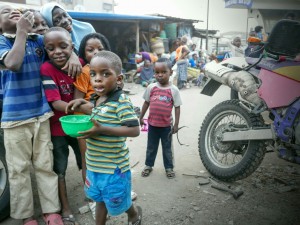 We go immediaely to Victor to fix my clutch, change oil and front tyre on Suusi and replace the broken ignition lock with the new one I brought with me. This Victor is an incredible mechanic. He works on the filthy street, in the pitch black African night just with a torch in his mouth. With virtually no tools to speak of, he opens the secure bolts on my ignition. Big night, the bikes are ready, we are exhausted. Just finishing up everything ready to go early next morning.
We go immediaely to Victor to fix my clutch, change oil and front tyre on Suusi and replace the broken ignition lock with the new one I brought with me. This Victor is an incredible mechanic. He works on the filthy street, in the pitch black African night just with a torch in his mouth. With virtually no tools to speak of, he opens the secure bolts on my ignition. Big night, the bikes are ready, we are exhausted. Just finishing up everything ready to go early next morning.
I thought shipping the bikes to Lagos was a great idea, but it was not. In fact it was a terrible plan – I should have listened to people, who told me so. Not only it ended up costing more to get the bikes through customs than what we hope to get for them in Libreville, we spent 2 weeks holidaying in Lagos, waiting and hustling the customs agent. I have already posted a sales advert at the local Gabonese bikers club, but now that we are reunited with the bikes – it will be very emotional to give them up.
Lagos to Yaounde
New photo added to shared album
We hope to get as far as the capital of the Benin Kingdom – conveniently named Benin City. It is already hot by the time we get moving. It is fine to ride, but once you fo through blocked markets in villages it is steaming hot and the sweat flows in small rivers don the face and neck. But hell yeah, it is great to ride. Feels like an impotent had found a cure.
Nigerian traffic is something out of this world. On a 4 lane freeway you will suddenly find a truck steaming towards you on YOUR fast lane. They just flash the headlihrs so you get our of the way. It gets better, occasionally there are other trucks overtaking the truck who comes in the wrong direction in your fast lane. So you have two trucks coming at you on a two lane one-way street. As there are no traffic rules the only way you can regulate traffic is with physical obstacles. The freeways are separated by 60cm high barriers so that trucks wont be able to climb over. There are virtually no places to U turn for safety reasons. Instead the trucks take the shorter route drive a little bit in against the flow, to then get back to their side of the road 5-10km later when there is an opening for a U-turn. The other type of speed regulating obstacle is a pothole. There are plenty of those in the sizes and shapes I hadn’t encountered before. Yet again, there are ways around it – if there are too many potholes on your side of the road, then you just drive on the other side of the freeway opposite the flow for a little bit. Changing lanes doesn’t require looking in the mirror. Neither do they have turn indicators. These are not installed. or maybe they screw out the lamps the minute the drive home from the shop.
We have no more time to waste so we head east towards Cameroon. We reach Benin City when it is already dark and it is packed with the Volkswagen tramsporter minibusess. They look like they’ve been to the scrap yard and through the baling machine which crushes cars into a cube and then someone had come in with a small hammer and diligently knocked it back into an approximate shape of a VW transporter. I wouldn’t be surprised if they are imported as scrap metal to save on import duty. In the blocked traffic I manage to hit one of those busses who actually had a tail light installed with my pannier. We had to move fast to escape any trouble. In the heat of the potential pursuit we took a shortcut on the sand road when Juka records the first fall, losing the tail of his bike in the soft sand.
Cameroon border is just a series of wooden huts and 6 checkpoints where something is being checked. The immigration officers all write a little essay on the blank piece of paper which narrates about the documents we carry, what we’re doing in Cameroon, a short CV and where we’re heading next. On a random A4 paper. When they asked Juka about his occupation – he responded “artist” on which the officer asked – “like Tom Sawyer?”. Another one picks on our British army boots and my cargo pants, suggesting we are spies, who are recording intelligence about the important Cameroonian landmarks and facilities. Fortunately it is easy to turn the conversation to bikes, how big are the cylinders, their top speed and let the modded exhaust roar.
The border runs through pretty thick jungle along Cross River, with only three bridges, which are border points.
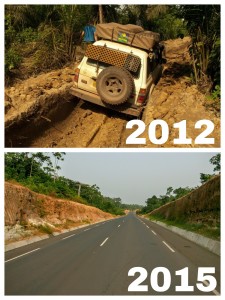 The 50km road from the Cameroon border to the nearest town Mamfe and 120km further to Bamenda has been notorious with overlanders as the toughest road in Africa. We got no pleasure of that. Last year it was rebuilt by the Chinese and now it felt like riding in the Swiss alps, but through a rainforest. I have no clue why would the Chinese build such a marvel of a road in the middle of Africa – there’s not much Nigeria-Cameroon trade as much as I know and the Chinese goods can enter through the port in Douala.
The 50km road from the Cameroon border to the nearest town Mamfe and 120km further to Bamenda has been notorious with overlanders as the toughest road in Africa. We got no pleasure of that. Last year it was rebuilt by the Chinese and now it felt like riding in the Swiss alps, but through a rainforest. I have no clue why would the Chinese build such a marvel of a road in the middle of Africa – there’s not much Nigeria-Cameroon trade as much as I know and the Chinese goods can enter through the port in Douala.
We turn off that beautiful road, drive a mile down a footpath in the jungle and find a great spot to camp in the midde of an oil palm plantation. There is a fireplace where they heat the palm nuts and a press for extracting the oil. Palm oil, which was used to make soap, was the draw of British colonialists to the region, the Niger river was used to be called the oil river. The local labour was paid was paid with 4 bags of salt. I don’t get it – did they not have salt before? And if the didn’t why did they get so hooked to work their asses off for it?
The first thing that strikes with Cameroon is cleanliness. The villages are poor, just a group of wooden sheds, but they are clean. People don’t lie around and sleep on the curb like you see in Nigeria – they happily mind their own business, usually we see them either heading to the fields or returning with produce. I get a sense that they are quiet, hard working yet jolly people, who don’t need much, but know they need to bring the crops in to survive the wet season. Reminds me much of Polish, in the best of sense.
They say that Cameroon is like a mini-Africa, ranging from the desert in the north through mountains in the middle to the tropical impassable rain forest in the south. We are heading to the mountains and the Chinese tarmac leads us up beyond Bamenda at 1800m above the sea level. As the climate up there is a bit cooler, farming is perfect for the Cameroonian highlanders, who make up 30% of the population. We turn onto dirt roads and find ourselves going through an endless village, with chinese 125cc bikes operating as taxis along the road. Would they benefit from Uber? They never hang around, they’re just going from one end of the road to the other – there is always someone hitching a ride. These roads can be 40-100km long with a hut/house every 50m and no space in between.
Film
New photo added to shared album
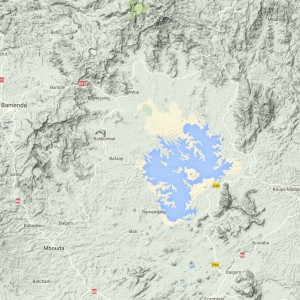 We were on our way to check out a curious shaped lake and on one of those red dusty roads when the night started to fall, inching on in the 2nd gear, rarely in the 3rd. Ten minutes later it was pitch dark and stars were bright in the sky, us in the middle of the never ending village and no space to park without taking attention of 20 pair of eyes immediately. Short of knocking on someone’s door and asking if we can camp in their yard after 2 hours of night riding on the dirt road we reach the lake, find a footpath that heads through the rice plots and set up camp in the midst of swampy nightlife of frogs, birds, snakes and imaginary crocodiles.
We were on our way to check out a curious shaped lake and on one of those red dusty roads when the night started to fall, inching on in the 2nd gear, rarely in the 3rd. Ten minutes later it was pitch dark and stars were bright in the sky, us in the middle of the never ending village and no space to park without taking attention of 20 pair of eyes immediately. Short of knocking on someone’s door and asking if we can camp in their yard after 2 hours of night riding on the dirt road we reach the lake, find a footpath that heads through the rice plots and set up camp in the midst of swampy nightlife of frogs, birds, snakes and imaginary crocodiles.
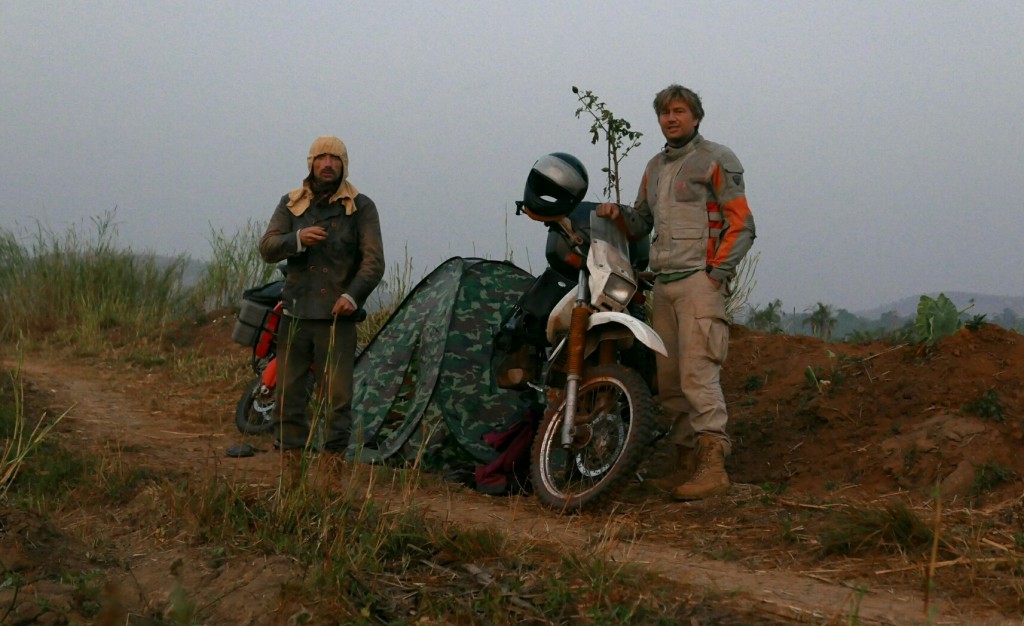 Sun is switched on 6:30 am, we get up 6am when it is still dark and can enjoy the sounds of nature record being switched on and turned to loudness-boost. Nature is clockwork here.
Sun is switched on 6:30 am, we get up 6am when it is still dark and can enjoy the sounds of nature record being switched on and turned to loudness-boost. Nature is clockwork here.
When the League of Nations took Cameroon from Germany after WWI, the Brits got the western part of the country people now speak both English and French, then as we near Yaoundé, the language is predominantly French and it is hard to find anyone speaking pidgin. The Frenchness comes with its benefits, you can now find a patisserie in every town and maybe even get an espresso.
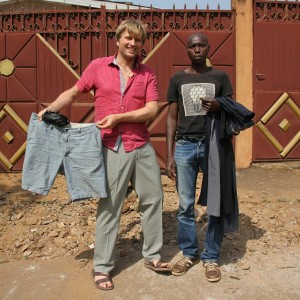 Yaounde is the administrative capital built on hills, traffic gridlocked by yellow heavily violated toyota corollas from ’81 – ’98. Our mission here is the Gabon visa, which is known to be notoriosly hard because of one particularly arrogant receptionist-lady at the embassy, who has averted many peoples’ plans from visiting Gabon to going direct to Rep Congo through some logging tracks in the eastern rainforests. Our first attempt failed though, because I wasn’t even allowed on the premises of the embassy in my trendy H&M linen shorts. Walking back to the hotel to get my pig-dirty cargo pants we met a walking trouser-shop, where €9 got me perfectly fitting suit trousers. Returning to the embassy, I was at my best behaviour for the feared receptionist, told her stories about the cold Estonia, all the sights we’re planning to see in Gabon and the trip we’ve taken on the bikes through Africa. Voila, 5pm we have the fresh Gabon visas handwritten into the passports.
Yaounde is the administrative capital built on hills, traffic gridlocked by yellow heavily violated toyota corollas from ’81 – ’98. Our mission here is the Gabon visa, which is known to be notoriosly hard because of one particularly arrogant receptionist-lady at the embassy, who has averted many peoples’ plans from visiting Gabon to going direct to Rep Congo through some logging tracks in the eastern rainforests. Our first attempt failed though, because I wasn’t even allowed on the premises of the embassy in my trendy H&M linen shorts. Walking back to the hotel to get my pig-dirty cargo pants we met a walking trouser-shop, where €9 got me perfectly fitting suit trousers. Returning to the embassy, I was at my best behaviour for the feared receptionist, told her stories about the cold Estonia, all the sights we’re planning to see in Gabon and the trip we’ve taken on the bikes through Africa. Voila, 5pm we have the fresh Gabon visas handwritten into the passports.
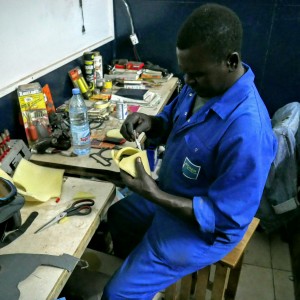 The final business in Yaounde is swapping in the brand new motocross rear tyres that we’ve been carrying, cleaning my air filter and replacing all the nuts and bolts that have already dropped off on the dirt road. In order to find a bike mechanic in a 3 million city with no bikes to be seen isn’t trivial. Fortunately the best resource works magic – someone had left geo-coordinates of Mr Abrams and the Horizon Unlimited travel forum. This is by far the most useful and the most inspiring resource on the internet for middle-aged farts like us, who go for round the world adventures on two wheels or old landcruisers. Like mr Victor in Lagos, the mr Abrams of Yaounde is no less of a miracle man. As my air filter was completely in shreds, he just constructed a new one from a sheet of foam he had lying around and then showed us pictures of all the bikers who had stopped at his shed touring Africa. He charged us €25 for labor and parts. We’re now ready to go south.
The final business in Yaounde is swapping in the brand new motocross rear tyres that we’ve been carrying, cleaning my air filter and replacing all the nuts and bolts that have already dropped off on the dirt road. In order to find a bike mechanic in a 3 million city with no bikes to be seen isn’t trivial. Fortunately the best resource works magic – someone had left geo-coordinates of Mr Abrams and the Horizon Unlimited travel forum. This is by far the most useful and the most inspiring resource on the internet for middle-aged farts like us, who go for round the world adventures on two wheels or old landcruisers. Like mr Victor in Lagos, the mr Abrams of Yaounde is no less of a miracle man. As my air filter was completely in shreds, he just constructed a new one from a sheet of foam he had lying around and then showed us pictures of all the bikers who had stopped at his shed touring Africa. He charged us €25 for labor and parts. We’re now ready to go south.
